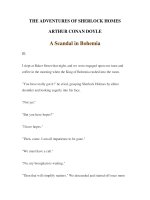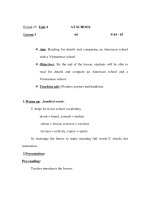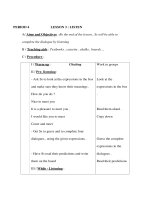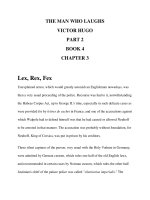4 1 3 innocent prisoners
Bạn đang xem bản rút gọn của tài liệu. Xem và tải ngay bản đầy đủ của tài liệu tại đây (3.3 MB, 12 trang )
Suggested levels for Guided Reading, DRA,™
Lexile,® and Reading Recovery™ are provided
in the Pearson Scott Foresman Leveling Guide.
INNOCENT
PRISONE
NER
RS!
Life in a Japanese American Internment Camp
by Gretchen McBride
illustrated by Tom McNeely
Genre
Historical
fiction
Comprehension
Skills and Strategy
• Sequence
• Setting
• Graphic Organizers
Scott Foresman Reading 4.1.3
ISBN 0-328-13420-1
ì<(sk$m)=bdecaf< +^-Ä-U-Ä-U
INNOCENT
PRISONE
NER
RS!
Reader Response
1. Make a list of the events in the story. Then review
the story and put the events on your list in order
from the first event that happened to the last.
2. Contrast the life of Japanese Americans before
Pearl Harbor and after. Use a chart like the one
below.
Life in a Japanese American Internment Camp
Japanese Americans
Before Pearl Harbor
After Pearl Harbor
Conclusion
3. Make a glossary of the words in the story that
relate to the internment camp setting. You might
begin with the word barracks. Write a definition
and then check your definition against a
dictionary definition.
4. Do you think it was wrong for the United States
government to intern the Japanese Americans?
Explain your answer. What do you think would
happen in a similar
situation
today?
by Gretchen
McBride
illustrated by Tom McNeely
Editorial Offices: Glenview, Illinois • Parsippany, New Jersey • New York, New York
Sales Offices: Needham, Massachusetts • Duluth, Georgia • Glenview, Illinois
Coppell, Texas • Ontario, California • Mesa, Arizona
“When will we be able to go back to our farm
in the San Fernando Valley, big brother?” Yukiko
asked. She was Japanese, as were all the families
in the camp.
“I don’t know,” said Aki. He spoke in Japanese,
which was the language of their parents and the
language they usually spoke at home. “Mama and
Papa don’t know.”
Yukiko knew there was a war going on. She
knew Japan had attacked Pearl Harbor, a naval
base in Hawaii, on December 7, 1941. Since then,
people in the United States treated their Japanese
neighbors differently.
The U.S. government moved all Japanese and
Japanese Americans to internment camps or
relocation centers in early 1942 because of fears
that they might become a threat to national
security. The small rooms in the camps were called
barracks. Every house was covered in tar paper,
and there was no private kitchen or shower.
Every effort has been made to secure permission and provide appropriate credit for
photographic material. The publisher deeply regrets any omission and pledges to
correct errors called to its attention in subsequent editions.
Unless otherwise acknowledged, all photographs are the property of Scott Foresman,
a division of Pearson Education.
24 ©Susan Steinkamp/CORBIS
ISBN: 0-328-13420-1
Copyright © Pearson Education, Inc.
All Rights Reserved. Printed in the United States of America. This publication is
protected by Copyright, and permission should be obtained from the publisher
prior to any prohibited reproduction, storage in a retrieval system, or transmission
in any form by any means, electronic, mechanical, photocopying, recording, or
likewise. For information regarding permission(s), write to: Permissions Department,
Scott Foresman, 1900 East Lake Avenue, Glenview, Illinois 60025.
2 3 4 5 6 7 8 9 10 V0G1 14 13 12 11 10 09 08 07 06 05
3
Yukiko went to find her father. She found him
sitting outdoors on a chair he had made from
scraps of wood. There wasn’t enough furniture
here, and people made their own from whatever
they could find.
How was it possible the family had been living
here for six whole months? “Come,” said Papa to
Yukiko. “Let’s go get breakfast at the mess hall.
We’ll join the whole family there.”
Everyone ate in the mess hall. Some families
ate together, but many people now ate with the
friends they had made at the camp. Yukiko liked
sitting with her friends, but she missed the way
her family used to eat in their own farmhouse.
She even missed doing chores and helping out on
the farm.
4
Yukiko knew Papa and Mama were not
American citizens. But she and Aki were because
they had been born in the United States.
“Someday you will vote in elections!” Papa told
them.
As the whole family sat at a big table together,
Aki began telling a funny story he’d heard.
“Speak softly,” Mama said. She was proud
of her children’s independent American ways,
but she could not get used to the boisterous
voices Americans used, and it was hard for her to
understand their American speech.
Mama got up. “Aki, make sure your sister gets
to school on time,” she said.
“Where are you going, Mama?” Yukiko asked
in Japanese, taking her mother’s hand.
“Ah,” Mama said with a private smile. “That
is a secret I am keeping. Now do not be late for
school.”
5
After breakfast, Aki walked his sister to
school, which was held in a small building across
the dusty yard of the camp.
“Do you know what kind of secret Mama is
keeping?” Yukiko asked. Aki shook his head.
“Are you going to be an American soldier after
you graduate?” Yukiko asked Aki. Some of Aki’s
friends went away to fight in the war. Yukiko felt
proud of them, but she was scared too. She loved
America, but she didn’t want Aki fighting any
Japanese in the war.
“Here you go. Study hard,” Aki said as he left
Yukiko at school. The building was covered in
dull black tar paper to keep out the dust. Yukiko
missed the old two-story brick school building at
home, and she missed her old classmates.
6
7
“Well, students, I have an exciting
announcement to make!” the teacher said.
“Some wonderful people have given our school
another blackboard! It will be mounted on our
classroom wall very soon.”
Yukiko was quiet. Until now, her teacher had
to write math problems on a piece of paper
tacked to the wall. She thought how nice it
would be to have a blackboard.
Yukiko wondered how people could be so nice
sometimes, and other times be so mean. She had
asked her father about this, but he merely shook
his head. “It’s wrong and unfair, but that is the
way it is, and we cannot change it,” he had said.
Yukiko wanted a better answer.
8
9
After school, Yukiko met Aki in the yard.
At this time of day, they always loved to look
at Mount Whitney in the distance. Today they
decided to walk to the edge of the camp, where
they could get the best view of the mountain.
Although it felt good to walk after sitting at
her school desk, Yukiko did not like the route
they took. She hated seeing the barbed wire, the
guard towers, and American soldiers holding real
guns. Most of the time, she could pretend these
things were not there. Sometimes she could even
pretend that she and her family were living in a
strange new town, but not now.
10
The wire and the guards made Yukiko feel as
if she had done something wrong—they made
her feel like a prisoner. But she and her family
had done nothing wrong! The whole situation
made her angry. How could her own government
treat her and her family this way?
“Look at the beautiful mountain peaks!” said
Aki.
Yukiko lifted her eyes to the horizon. There
was snow-capped Mount Whitney towering
above the desert. It really was breathtaking.
11
“I know the very best place to see the peak,”
Aki said. “Follow me!” They rounded a growth
of sage brush. Then they stopped, amazed and
bewildered. There, seated on a rock, was the
oldest man Yukiko had ever seen.
The old man was sketching something on a
large pad of paper. He looked up and saw them
and gave them a big smile.
“Young ones,” the old man said. “Before us is
a great mountain—Mount Whitney! I come here
often to admire it and to remember.”
“Remember what?” asked Yukiko.
“This,” the old man said, showing them his
drawing. But it was not Mount Whitney. “This
is Mount Fuji,” the old man said. “It is in Japan,
and it is sacred.”
12
13
“Maybe after the war, you’ll return to Japan,”
said Aki. “You can see Mount Fuji again.”
“I will never return to Japan,” sighed the old
man. “I loved my homeland, but my life there
was a hard one because we were poor. I urged
my children to move to America for a better life,
and they did. Soon, they sent for me.”
He smiled sadly. “It is a mystery how we could
all end up here behind these wires. I come here
to think about this in the shadow of this great
American mountain. It is now my Mount Fuji.”
“Have you solved the mystery?” Aki asked.
“Do you understand why we are here?”
“Ah,” the old man said,” I see that even you—
so young—struggle with the mystery.”
The old man smiled once more and handed
Yukiko the drawing of Mount Fuji. Then he
picked up his walking stick and slowly made his
way along the dusty path back to the camp.
Aki and Yukiko walked a little and then
stopped to gaze at the majestic snow-covered
peak.
“Imagine,” Aki said, “how clean the snow
must be so far above the dust.”
14
That evening at dinner, Aki sat with the older
boys. That evening there were more complaints
than usual about the hot dogs and beans.
Suddenly a man stood up. “When this is over,
we need to turn our backs on the United States
and go back to Japan!” he shouted.
“You are wrong! We are not Japanese. We are
Japanese Americans! America is our home too,”
cried another man.
A shadow of a small woman fell across their
table. It was Mama! “We must not disturb the
peace of the other diners,” she said in Japanese.
“Let us all think hard about what is the right
thing to do.”
15
After dinner, the family walked back to their
home. “Mother,” Yukiko said suddenly, “what is
your secret?”
This brought a smile to her mother’s face.
“Yukiko,” she said, “what did you do in school
today?”
The family looked at her in stunned silence.
Finally, Aki spoke. “English! Mother, you spoke in
English!”
“This is my secret,” she said proudly. “I have
no cooking to do, so I take class. I study English
every morning.”
16
The wind began to blow the dust. “Another
dust storm!” cried Aki. Talking was now
impossible. Aki drew his jacket up to cover his
nose and mouth with one hand. He put his other
arm around Yukiko’s shoulder.
Once inside the house, Father passed out rags.
They pressed the rags into the cracks in the walls
and the floor so the dust couldn’t get in.
17
Three long years passed. Every year was
harder than the one before. Yukiko felt as if they
would never get out of the camp. And then, one
morning, Yukiko heard great excitement outside.
“The war is over! We’re going home!” someone
cried. Everyone was laughing and cheering.
18
Everyone gathered in the mess hall. Some
people said they were going back to Japan.
Other people wanted to go back to their
American homes. But they were worried—would
their homes still be there?
“What will we do?” Yukiko asked her parents.
“What do you want to do?” Father asked
Yukiko. She thought long and hard. “I want to
stay in America,” she said. “This camp was a
terrible thing. But this is still our country, isn’t
it?”
“I want to stay, too,” said Mama. “It will be
hard, but how else can I practice my English? I
do not want to give up either language or either
country. Someday, we will all visit Japan.”
“I would like to see Mount Fuji,” Yukiko said.
She suddenly knew the first thing she would do
when they got out of the camp and into a new
home. She would hang the old man’s drawing of
Mount Fuji next to a drawing of Mount Whitney.
Both mountains and both countries were
important to her.
19
20
America Makes Amends
Reader Response
When the Japanese launched a surprise attack
on the ships in Pearl Harbor, the United States
was horrified. Japanese Americans were horrified
too. But what horrified them more was how they
were treated by some of their neighbors and
by their own government. The Japanese were
treated as if they were no longer Americans.
They were treated as if they were to blame for
the attack on Pearl Harbor.
The U.S. government, worried that they might
be spies, put Japanese Americans into special
camps called “relocation centers.” After the war
ended, the camps were closed. The last camp was
closed in 1945.
Since that terrible
time, America has
realized that Japanese
Americans were treated
unjustly. In 1988,
Congress gave money to
every Japanese person
who had been in a camp.
In 1990, President George
H. W. Bush sent letters of
apology to them.
1. Make a list of the events in the story. Then review
the story and put the events on your list in order
from the first event that happened to the last.
2. Contrast the life of Japanese Americans before
Pearl Harbor and after. Use a chart like the one
below.
Japanese Americans
Before Pearl Harbor
After Pearl Harbor
Conclusion
3. Make a glossary of the words in the story that
relate to the internment camp setting. You might
begin with the word barracks. Write a definition
and then check your definition against a
dictionary definition.
4. Do you think it was wrong for the United States
government to intern the Japanese Americans?
Explain your answer. What do you think would
happen in a similar situation today?









